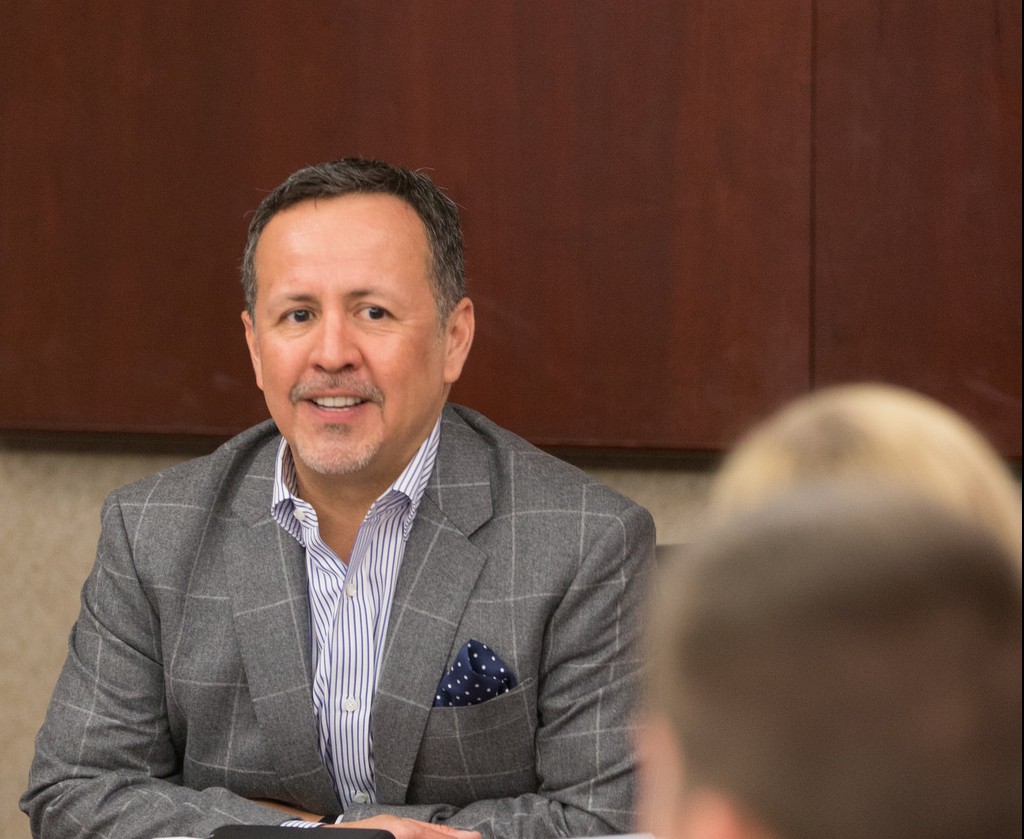Tom Jenkins ’92 shares wisdom for Millennials
March 7, 2016
|
Mays Business School
The job of a financial advisor encompasses multiple elements of business – marketing and sales, management of staff and clients, and analysis of finance, capital markets and portfolios. But for Tom Jenkins ’92, it also means telling stories. As Senior Vice President of Wealth Management at Jenkins & Associates of UBS Financial Services, Jenkins manages more than $200 million for 75 wealthy families and individuals. Managing wealth is a sensitive topic, and Jenkins has learned that stories can help him convey important advice in a way that both educates and resonates with his clients. He showed Business Honors students at Texas A&M’s Mays Business School how storytelling can be a powerful tool not just in financial advising, but in life as well.
As Senior Vice President of Wealth Management at Jenkins & Associates of UBS Financial Services, Jenkins manages more than $200 million for 75 wealthy families and individuals. Managing wealth is a sensitive topic, and Jenkins has learned that stories can help him convey important advice in a way that both educates and resonates with his clients. He showed Business Honors students at Texas A&M’s Mays Business School how storytelling can be a powerful tool not just in financial advising, but in life as well.
“It’s important to have a story with everything – be it with a recruiter, interviewer, whomever you encounter,” he advised. “Stories help define who you are. Have those and practice those, and always be prepared to share them.”
Jenkins shared his own story with the students. He began his education at Texas A&M, where he studied marketing and enjoyed success on campus as a member of the Corps of Cadets and the Business Student Council. Also heavily involved in summer internships, he received multiple job offers and accepted a marketing position at NationsBank. Things were going well.
But within just 10 months of starting his new job, he was laid off. He was jobless and faced with a dire financial situation due in part, he admits, to poor financial management during those first months after college. To make ends meet, he took jobs selling suits and delivering pizzas.
Take ownership of your career
“That was a real shocker for me. I was so discouraged from having gone from where I was in college to balancing those two jobs at once. I didn’t foresee it happening,” he recalled. Yet Jenkins had a plan. Knowing his ultimate goal, he decided to open his own financial advising business while holding the other two jobs. Though it was difficult holding multiple jobs at once, he said the lesson was that he was learning to take ownership of his career through hard work and financial responsibility.
“Things aren’t always going to go our way,” he said. “But think about and plan what you’re going to do – what you’re willing to do – to work hard and get where you need to be and want to be.”
Seek others’ wisdom
To grow his business, Jenkins said he harnessed the power of networking. “I had a shoebox full of business cards I had collected from recruiters during college, and I began calling the people on the cards,” he said. His contacts gave him guidance on how to succeed in the industry and referred people who became Jenkins’ newest clients.
“I really learned importance of finding mentors and seeking others’ advice and input,” he said. “Always ask yourself, ‘Who can I seek advice from?’”
To whom much was given, of him much will be required
For five years, Jenkins worked hard running his own financial planning practice before Merrill Lynch took an interest and approached him about moving his practice to join the company. He accepted and worked there for 12 years. During that time he participated in graduate work through the Harvard University Extension School and received the Certified Investment Management Analyst ® designation from Wharton’s Business School of Executive Education, a certification held by only a small percentage of his colleagues in the industry. In 2010, he joined UBS.
Jenkins explained how he appreciates the flexibility of picking his own clients, developing relationships with them and tailoring a portfolio that is best fit for their needs. “I take a lot of pride in helping people be good stewards of their money,” Jenkins said. “You’ve heard the saying ‘to whom much is given, much is expected.’ If you have intelligence, financial luxuries, whatever it may be, you have an obligation to use those gifts to help others.”
Advice for Millennials and financial wisdom
One student wanted to know what Jenkins would advise today’s college students. “Millennials have a greater access to information than those in times in times past. Unfortunately, they don’t always value the input of a financial advisor as much as previous generations.” Jenkins added: “Remember that you should always outsource areas that are not your expertise to those who can help you; invite them to be on your team.”
He also gave financial advice, drawing on principles he uses in his own practice:
- Have an emergency reserve of cash for three to six months
- Prioritize giving and saving with Dave Ramsey’s “out of sight, out of mind” principles
- Allocate money to spend guilt-free on things you enjoy, but only after you handle all of your goals
- Be careful with debt – only use it as leverage for a greater return in the future


